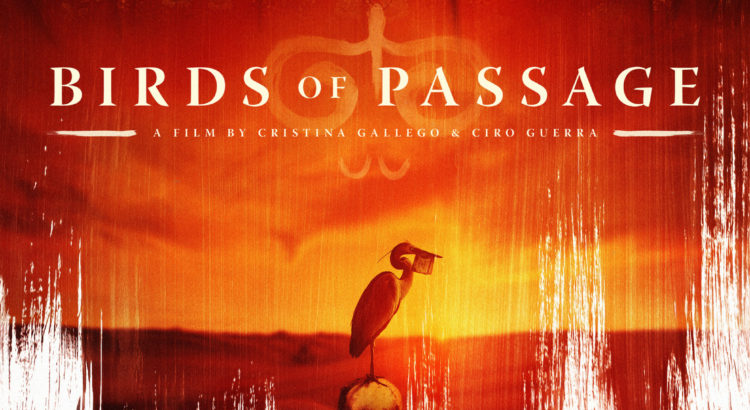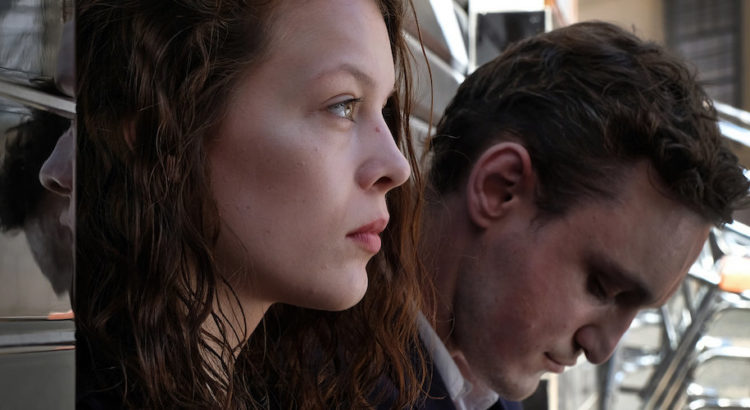Transit, a film directed by Christian Petzold and based on the 1940s novel by Anna Seghers, opens at the Michigan Theatre April 1st. Ms. Seghers’ novel is a depiction of a German in Paris desperately trying to escape the country during the Nazi occupation in the 1940s, by assuming the identity of a dead writer and seeking a ship to take out of the port city of Marseilles. Petzold takes this World War II drama and puts a unique spin on it, transporting it to the present where the threat isn’t as clearly defined as the Nazi occupation, but is something more modern and ambiguous. The film’s plot offers a tantalizing array of elements, from the dramatic action of a wartime saga, to a complex accidental love interest that jeopardizes the lead character’s plans, to a more philosophical look at the mirror 1940s Nazi France can hold up to today’s society. Transit is being shown in German, with English subtitles.
Author: Abigail Fox

REVIEW: Birds of Passage
The beginning of Ciro Guerra and Cristina Gallego’s Birds of Passage opens with a symbolism-laden new beginning: a young girl’s transition into adulthood. The Wayuu people at the center of the film celebrate this occasion with a festival of family, friends and dancing. But it is the dancing that provides the clearest window into the future of this sprawling clan. The daughter on the brink of womanhood, Zaida, is dancing the Yonna, a fast-paced give-and-take between her and another man. She is dressed in a flowing red garment, racing back and forth to the beat of a drum, the camera closely following their faces and imparting the dramatic feeling that you too are being chased in the circle, racing around and around in the ambiguous fear of what might happen if you stop. Her first partner, a young boy named Leonidas, eventually trips and falls to the ground. The dance stops, but not for long, as an outsider to the clan named Rapayet steps up and enters the fray, outlasting the drum, and making his first mark on the clan he will eventually join.
The clan is led by a powerful matriarch, Úrsula, who makes clear from the start that her power lies in her willingness to do anything to protect her family. Rapayet, a suitor intent on marrying Zaida, strikes Úrsula as a danger, but possibly even she does not realize the depth to which he will uproot her family and her culture. The Wayuu of northern Colombia had persevered through the rise of the modern nation by their adherence to their traditional practices that Úrsula is determined to protect. As Rapayet ventures into the marijuana trade to finance his dowry for Zaida, he finds himself sucked into a whirlpool of greed and desperation despite his best efforts to preserve the culture of honor. It is only a matter of time before the consequences manifest themselves.
Rapayet, Zaida, and their two children eventually move into a grand stucco villa in the middle of the barren desert, a visual metaphor for the isolation their wealth has granted them. The film is a deliberate exploration of the fine line between providing for your family and sacrificing them in pursuit of these provisions. It showcases the delicate tension between the traditional ways and the allure of 20thcentury wealth and luxury, and the mythic power of the dollar, propelling business and violence across the Colombian desert in an ancient blue Jeep.
Now showing at the State Theatre. In Wayuu, Spanish, and Wiwa with English subtitles.

PREVIEW: Birds of Passage
Birds of Passage (Spanish title: Pajaros de Verano) is screening at the State Theatre this week (beginning Friday, March 22). An epic crime film that received the Colombian nomination for best foreign language film for the 91stAcademy awards and was selected for the December shortlist. The drama centers on a Wayúu indigenous family during the illegal drug trade of the 1960s and 70s, illustrating the moral costs of the all-encompassing pursuit of power and wealth. The film will be screened daily at the State Theatre, with audio in Spanish, Wayuu, and Wiwa, with English subtitles.

REVIEW: Benjamin Britten’s War Requiem
Benjamin Britten’s War Requiem was commissioned for the re-consecration of Britain’s Coventry Cathedral, a beautiful church tragically destroyed in a World War II bombing. Britten himself was a staunch pacifist who had registered as a conscientious objector during the war, and the unique combination of these two elements gave birth to a piece that cuts through the gloss of glorified war stories into the more complex, tragic truth of the raw destruction of war. The text of the 80-minute choral piece is assembled from the Latin Mass for the Dead and the poems of Wilfred Owen, a World War I soldier who was killed just a week before the armistice at the young age of 25. Owen’s poetry is plainly anti-war, and the first of his lines in the piece is the chilling “What passing bells for these who die as cattle?”.
The requiem was presented as the collaboration between the Ann Arbor Symphony Orchestra, the UMS Choral Union, the Ann Arbor Youth Chorale, as well as three vocal soloists. The addition of the children’s chorale as specified by the original work adds a uniquely haunting aspect to the piece, a reminder that war ultimately results in a great deal of innocence lost, and the sacrifice of young lives with full futures ahead. Britten alternates between dissonant chanting mixed with layers of percussion and smooth, lyrical passages as the piece glides from movement to movement. Yet throughout the entire piece, the atmosphere is solemn, almost haunting. Britten refuses to let the audience forget why the piece was conceived, as a response to a tragedy brought about by the senselessness of war. It is impossible to hear the words of Owen echo through the auditorium in the rich tenor of soloist Anthony Dean Griffey without feeling an acute sense of what we have lost to the cruelty of war. Owen himself was a poet who garnered an abundance of post-humous acclaim despite his short career and the few poems he wrote; his career was brought to an abrupt end by a premature death on the battlefield.
Owen is merely one of many young talents, or simply young people, or people in general, whose lives were stolen from them by the merciless combat between sides. War Requiemserves as a haunting reminder that war is not a necessary evil, nor is it one we can afford to distance ourselves from. In the United States, it is perilously easy to turn a blind eye to those suffering from wartime brutality in other countries and in the modern age it is perilously easy to designate war as a “necessary evil”, a tragic yet inevitable byproduct of civilization. Yet as Britten wants us to remember, in a society as advanced as ours, the fact that we have accepted senseless violence over superficial causes as the price of civilization ought to haunt us, and we ought to remember that we have more power over our fates than we like to admit.

REVIEW: Danish String Quartet
From the second the lights dimmed to the final vestiges of the post-encore standing ovation, the Danish String Quartet captivated the audience with a performance as passionate as it was technically proficient. The program was presented at Rackham Auditorium, a venue that seemed uniquely suited to the performance, being large enough to contain a nearly sold out crowd, but small enough to foster the sense of intimacy that is so important to chamber music. The program opened with Haydn’s String Quartet in C Major Op. 20, No. 2, a wonderfully lyrical example of classical chamber music that the quartet executed flawlessly.
The second piece presented was Hans Abrahamsen’s String Quartet No. 1 (“Ten Preludes”), a contemporary Danish work that offered a refreshing departure from the typical classical chamber fare. The piece was composed of ten short movements, each drastically different from each other—some smooth and lyrical, others almost dissonant and jarring—that somehow work together to form a uniquely cohesive whole. The second violinist of the quartet, Frederik Øland, introduced the piece as similar to “going to a restaurant where they serve you only ten small starters” yet somehow at the end, you “still feel satisfied”. The departure from classical chamber music into something contemporary was satisfying indeed, made even more so by the beauty and diversity of the contemporary piece.
Chamber music is known for being challenging due to the both the lack of conductor and the transparency of the music. There is no opportunity to lean on one’s string section, every night, every performance, each member of the quartet must function as both a soloist and also a cohesive group member, shining and supporting in turn. The Danish String Quartet showed mastery of these skills Thursday night. The transitions between movements were timed flawlessly and the acoustic presence of the quartet was immense, proving once again that the value of chamber music is that the whole is greater than just the sum of its parts.
The quartet rounded out the program with a passionate rendition of Beethoven’s String Quartet in F Major, Op. 135. But the real highlight of the program came after the scheduled pieces were completed, when after receiving a well-deserved standing ovation, the four returned to the stage for an encore performance. The quartet played Shine You No More, a piece written by their very own first violinist, Rune Tonsgaard Sørensen. This lively quartet possibly outshone the rest of the program, with an upbeat tempo and melody evoking both folk music and the soaring tones of movie soundtracks. If you ever get the opportunity to see these four in concert, I highly recommend it, but at the least, visit them on Spotify and hear for yourself.

PREVIEW: Danish String Quartet
This Thursday, the Danish String Quartet returns to Rackham Auditorium to grace the UMS program for the second time. Their program for Thursday includes string quartet pieces by Haydn, Beethoven, and the Danish composer Hans Abrahamsen. Although the quartet is now a world-renowned traveling group, they come from stunning humble and interesting origins. The three founding members of the group met at summer camp for musicians when not yet teenagers and formed friendships through playing soccer together. The group was officially formed when the members were just 15 and 16, and despite their notable success over the past 15 years, still name “hanging out with friends” as their favorite part of music.
Listen to the Danish String Quartet:


